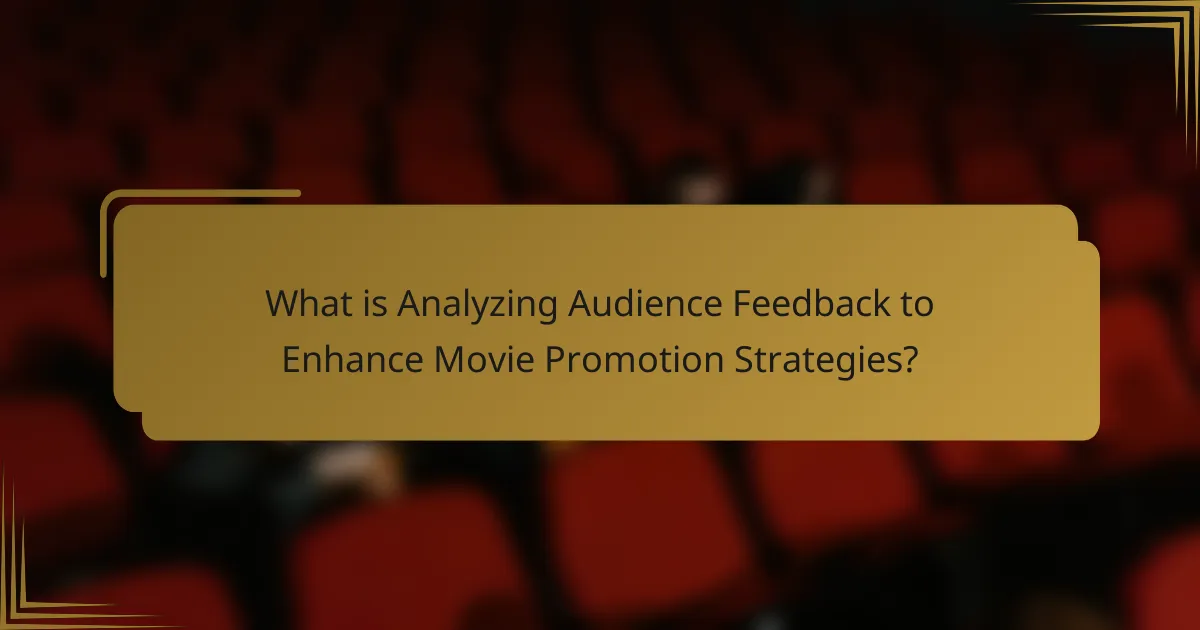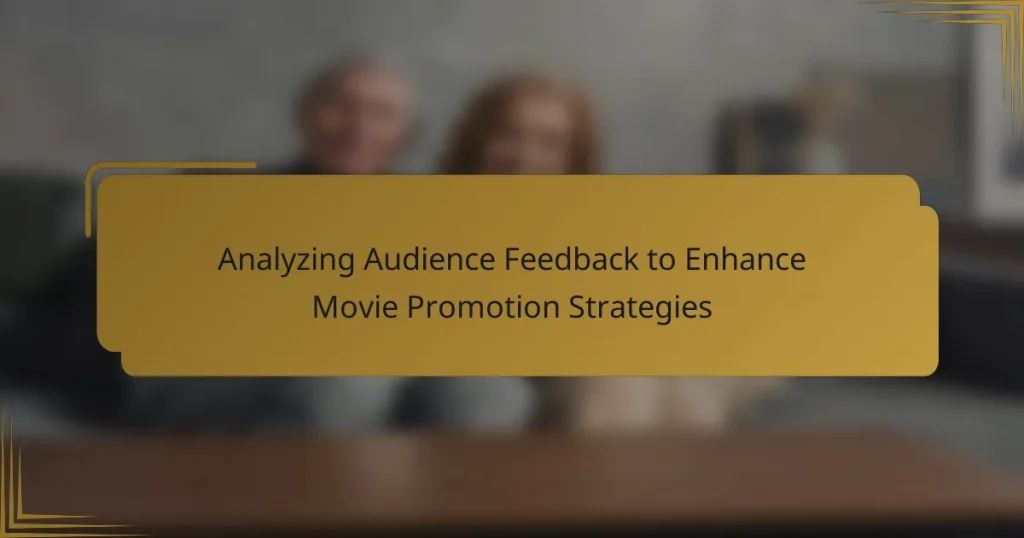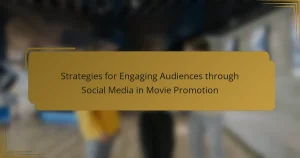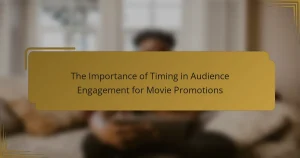
What is Analyzing Audience Feedback to Enhance Movie Promotion Strategies?
Analyzing audience feedback to enhance movie promotion strategies involves collecting and interpreting viewer responses. This process helps filmmakers understand audience preferences and sentiments. By utilizing surveys, social media comments, and reviews, studios can identify what resonates with viewers. This information allows for targeted marketing campaigns that align with audience interests. For instance, a study by the University of Southern California found that movies with strong audience engagement on social media tend to perform better at the box office. Thus, leveraging audience feedback can significantly improve promotional effectiveness and drive ticket sales.
How does audience feedback impact movie promotion strategies?
Audience feedback significantly influences movie promotion strategies. It helps filmmakers understand viewer preferences and expectations. Positive feedback can enhance promotional efforts, creating buzz through word-of-mouth. Negative feedback may prompt adjustments in marketing tactics or even content changes. For example, trailers may be edited based on audience reactions. Social media platforms amplify audience voices, making their feedback more impactful. Research indicates that films with higher audience ratings often see increased box office performance. This correlation highlights the importance of integrating audience feedback into promotional planning.
What types of audience feedback are most valuable for movie promotions?
Audience feedback that is most valuable for movie promotions includes social media engagement, reviews, and audience surveys. Social media engagement provides real-time reactions and helps gauge audience interest. Reviews on platforms like Rotten Tomatoes and IMDb influence potential viewers’ decisions. Audience surveys gather direct insights on preferences and expectations. These types of feedback allow marketers to tailor promotional strategies effectively. According to a study by the University of Southern California, 70% of moviegoers are influenced by online reviews when choosing a film. This demonstrates the significant impact of audience feedback on promotional success.
How can audience sentiment be measured effectively?
Audience sentiment can be measured effectively through various methods. Surveys and questionnaires provide direct feedback from the audience. Social media monitoring captures real-time reactions and sentiments expressed online. Sentiment analysis tools utilize natural language processing to analyze text data from reviews and comments. Focus groups offer qualitative insights through discussions and reactions to content. Data analytics can track engagement metrics such as likes, shares, and comments to gauge audience feelings. Research shows that combining these methods yields a comprehensive understanding of sentiment. For instance, a study by Pew Research Center highlights the effectiveness of mixed-method approaches in capturing nuanced audience opinions.
Why is audience engagement crucial in movie promotion?
Audience engagement is crucial in movie promotion because it drives visibility and interest. Engaged audiences are more likely to share content and generate buzz. This word-of-mouth marketing can lead to increased ticket sales. According to a study by the Motion Picture Association, films with higher social media engagement often see greater box office success. Engaging with the audience can also provide valuable feedback. This feedback can inform marketing strategies and improve future projects. Overall, audience engagement creates a community around the film, fostering loyalty and anticipation.
What role does social media play in gathering audience feedback?
Social media serves as a vital tool for gathering audience feedback. It allows brands to engage directly with their audience in real time. Platforms like Twitter and Facebook facilitate instant communication. Users can share opinions, reviews, and reactions quickly. This immediate feedback loop helps brands understand audience sentiments. Research indicates that 79% of consumers expect brands to respond to their feedback on social media. Additionally, social media analytics tools can quantify audience reactions. These insights inform marketing strategies and enhance promotional efforts. Thus, social media is essential for effective audience engagement and feedback collection.
How can audience feedback influence promotional content creation?
Audience feedback can significantly influence promotional content creation by providing insights into audience preferences and expectations. This feedback can guide marketers in tailoring messages that resonate with their target demographic. For example, data from surveys or social media comments can highlight which themes or elements excite the audience. Additionally, audience feedback can reveal areas of confusion or dissatisfaction, allowing marketers to adjust their strategies accordingly. A study by Nielsen found that 70% of consumers are more likely to engage with brands that listen to their feedback. This demonstrates that incorporating audience input can enhance engagement and effectiveness in promotional campaigns.
What are the key methods for analyzing audience feedback?
Key methods for analyzing audience feedback include surveys, focus groups, social media analysis, and sentiment analysis. Surveys gather quantitative data directly from the audience. They can measure satisfaction levels and preferences. Focus groups provide qualitative insights through in-depth discussions. Participants share their thoughts and feelings about specific content. Social media analysis examines audience reactions in real-time. It tracks mentions, shares, and comments across platforms. Sentiment analysis employs algorithms to evaluate audience emotions in feedback. This method identifies positive, negative, or neutral sentiments. Each method offers unique insights that can inform movie promotion strategies.
How can surveys and polls be utilized for effective feedback analysis?
Surveys and polls can be utilized for effective feedback analysis by systematically collecting audience opinions. They allow filmmakers to gauge audience reactions and preferences. This data can inform promotional strategies and content development. Surveys can include quantitative questions for measurable data. Polls can provide quick insights into specific aspects of a film. Analyzing responses helps identify trends and areas for improvement. For instance, a survey might reveal that 70% of viewers prefer action over romance in movies. This insight can guide marketing messages and target demographics effectively.
What tools can assist in analyzing audience feedback data?
SurveyMonkey offers robust survey tools for gathering audience feedback. It allows users to create customized surveys and analyze responses effectively. Google Forms is another tool that provides a simple way to collect and analyze feedback. It integrates well with Google Sheets for data analysis. Qualtrics is a more advanced platform, offering detailed analytics and reporting features. It is particularly useful for large-scale feedback analysis. Social media analytics tools like Hootsuite and Sprout Social can also analyze audience sentiment from social media interactions. These tools provide insights into audience opinions and preferences. Each of these tools is widely used in the industry, ensuring reliability in analyzing audience feedback data.
How can insights from audience feedback be implemented?
Insights from audience feedback can be implemented by integrating the data into marketing strategies. First, analyze the feedback to identify common themes and preferences. This data can reveal what resonates with the audience. Next, adjust promotional content to align with these insights. This could involve changing messaging, visuals, or platforms used for promotion. Additionally, audience feedback can inform targeted advertising strategies. For example, demographics that show higher engagement can be prioritized. Implementing these changes can lead to improved audience connection and increased ticket sales. Research indicates that campaigns tailored to audience preferences yield up to 30% higher engagement rates.
What strategies can be developed from audience feedback analysis?
Strategies developed from audience feedback analysis include targeted content creation, improved messaging, and enhanced engagement tactics. Targeted content creation involves tailoring promotional materials based on audience preferences. Improved messaging focuses on refining communication to resonate better with viewers. Enhanced engagement tactics encourage interaction through social media and events.
These strategies can lead to higher audience satisfaction and increased ticket sales. For example, a study by the Harvard Business Review indicated that companies using customer feedback effectively saw a 10% increase in revenue. Therefore, analyzing audience feedback can significantly enhance movie promotion strategies.
How can movie marketing campaigns be adjusted based on audience insights?
Movie marketing campaigns can be adjusted based on audience insights by analyzing viewer preferences and behaviors. This can include tailoring promotional content to specific demographics. For instance, if data shows a younger audience prefers social media engagement, campaigns can shift focus to platforms like TikTok.
Additionally, audience feedback can guide the selection of trailers and posters that resonate more with target viewers. Research indicates that campaigns driven by audience insights can increase engagement by up to 30%.
Using surveys and social media analytics helps identify what resonates with audiences. This data allows marketers to refine messaging and choose appropriate influencers for promotion.
What best practices should be followed when analyzing audience feedback?
Best practices for analyzing audience feedback include categorizing feedback into themes. This helps identify common sentiments and issues. Next, prioritize feedback based on frequency and impact. High-frequency comments often indicate significant concerns or areas for improvement. Use quantitative methods, such as surveys, to gather measurable data alongside qualitative insights. This combination offers a comprehensive view of audience opinions. Additionally, regularly review feedback to track changes over time. This practice ensures that evolving audience preferences are addressed promptly. Finally, share findings with relevant teams to inform decision-making and strategy adjustments. These methods enhance the effectiveness of movie promotion strategies.
How can movie studios ensure they are capturing diverse audience opinions?
Movie studios can ensure they are capturing diverse audience opinions by implementing targeted audience research strategies. These strategies include conducting focus groups that represent various demographics. Surveys can also be distributed through multiple channels to reach different audience segments. Social media platforms provide valuable insights into audience sentiments and preferences. Additionally, studios can analyze viewer data from streaming services to understand diverse viewing habits. Engaging with community organizations can help studios gather feedback from underrepresented groups. Collaborating with cultural consultants can also enhance the authenticity of audience representation. These methods collectively improve the understanding of diverse audience perspectives, leading to more inclusive content creation.
What common pitfalls should be avoided in audience feedback analysis?
Common pitfalls to avoid in audience feedback analysis include confirmation bias, overlooking demographic differences, and neglecting qualitative insights. Confirmation bias occurs when analysts only seek feedback that supports pre-existing beliefs. This skews the understanding of audience preferences. Overlooking demographic differences can lead to generalized conclusions that do not apply to all audience segments. Each demographic may have unique preferences and responses. Neglecting qualitative insights, such as open-ended comments, can result in missing valuable context. These insights often provide depth that quantitative data cannot capture. Ensuring a balanced approach can improve the accuracy of feedback analysis.
What are the future trends in audience feedback analysis for movie promotions?
Future trends in audience feedback analysis for movie promotions include the use of artificial intelligence and machine learning. These technologies can analyze vast amounts of data quickly. Sentiment analysis tools will provide deeper insights into audience emotions. Real-time feedback mechanisms will allow for immediate adjustments in marketing strategies. Social media platforms will play a crucial role in gathering audience opinions. Virtual reality experiences may also be integrated to engage audiences more effectively. Predictive analytics will help forecast audience preferences and behaviors. These advancements will enhance targeted marketing efforts and improve overall campaign effectiveness.
How might technology shape the future of audience feedback in film marketing?
Technology will significantly enhance audience feedback in film marketing through real-time data collection and analysis. Advanced analytics tools will allow studios to gather insights from social media, streaming platforms, and online surveys. This data can provide immediate feedback on audience preferences and reactions. For instance, sentiment analysis can gauge audience emotions about trailers or promotional content. Moreover, artificial intelligence can personalize marketing strategies based on individual viewer behavior. Virtual reality and augmented reality can also create immersive experiences that encourage audience engagement. Overall, these technological advancements will lead to more targeted and effective marketing strategies, ultimately improving audience satisfaction and box office performance.
What emerging tools could enhance audience feedback collection and analysis?
Emerging tools that could enhance audience feedback collection and analysis include AI-driven sentiment analysis platforms. These tools analyze social media comments and reviews to gauge audience emotions. Machine learning algorithms improve accuracy over time by learning from data patterns. Additionally, interactive survey tools allow real-time feedback during screenings. These tools engage audiences and capture immediate reactions. Mobile feedback applications enable users to share their opinions conveniently. Data visualization software helps in interpreting feedback trends effectively. Together, these tools provide comprehensive insights into audience preferences and sentiments.
What actionable tips can enhance movie promotion strategies through audience feedback?
Engaging with audience feedback can significantly enhance movie promotion strategies. First, collect feedback through surveys or social media polls. This allows filmmakers to understand audience preferences. Next, analyze the feedback to identify common themes or concerns. Use this data to tailor marketing messages that resonate with the audience. Additionally, implement audience suggestions when possible to build goodwill. Highlight positive feedback in promotional materials to attract new viewers. Finally, continuously monitor audience reactions post-release to adjust marketing strategies for future projects. This iterative process fosters a connection with the audience and improves promotional effectiveness.
Analyzing audience feedback is a critical process for enhancing movie promotion strategies. This article explores how studios can collect and interpret viewer responses through various methods, such as surveys and social media analysis, to understand audience preferences and sentiments. It highlights the impact of audience engagement on promotional effectiveness, the types of feedback that are most valuable, and best practices for analysis. Additionally, it discusses the role of technology in shaping future trends in audience feedback and how actionable insights can be implemented to optimize marketing campaigns and drive ticket sales.




